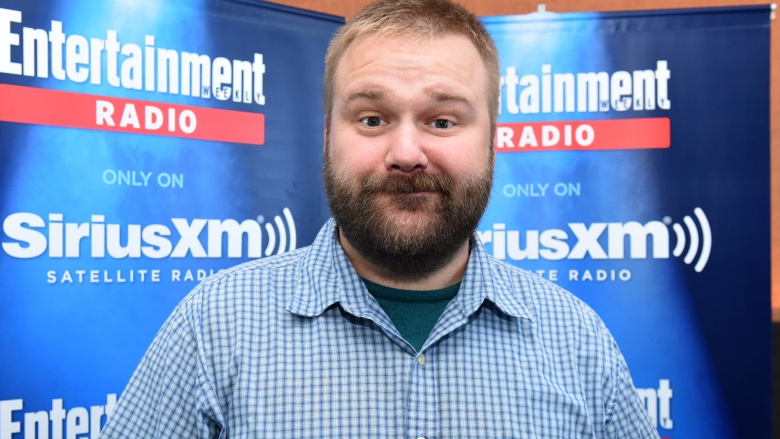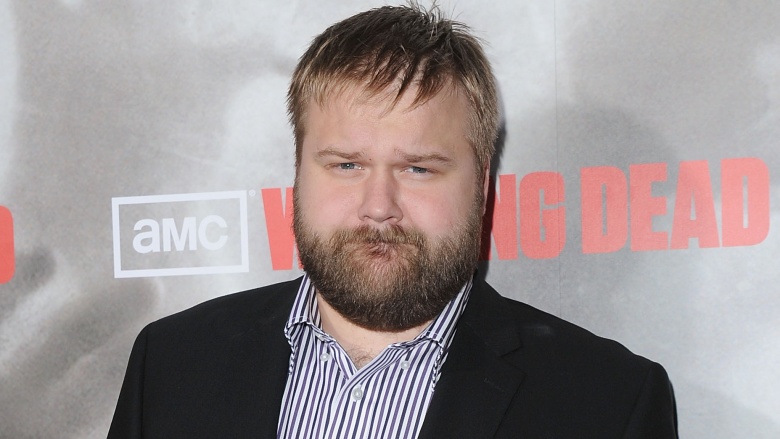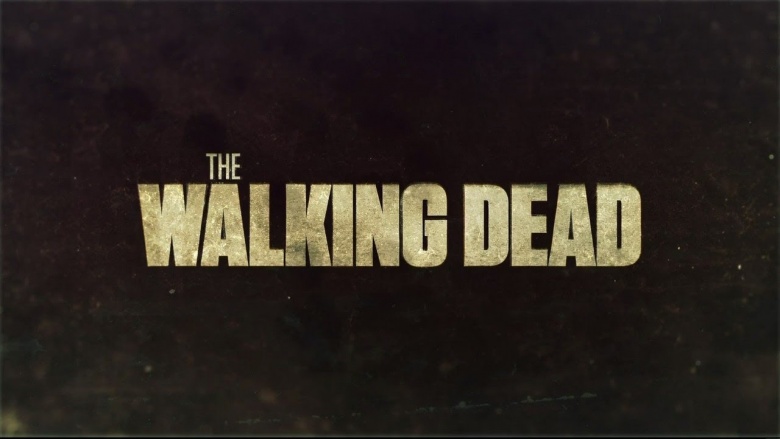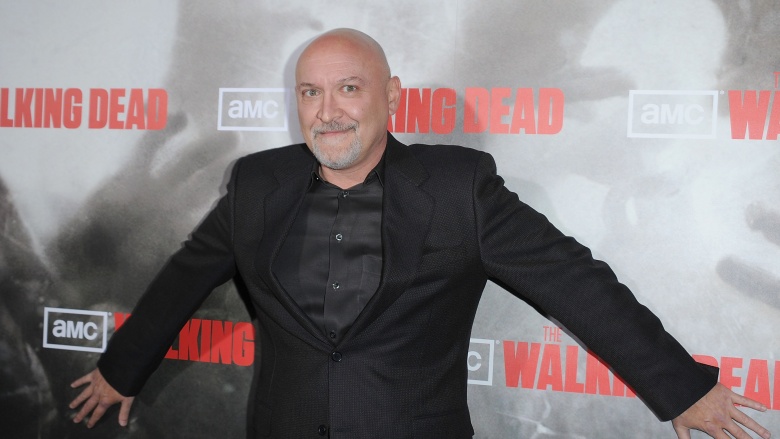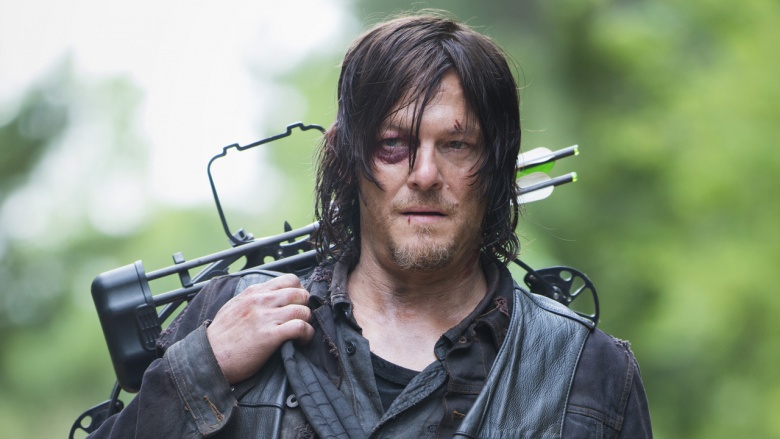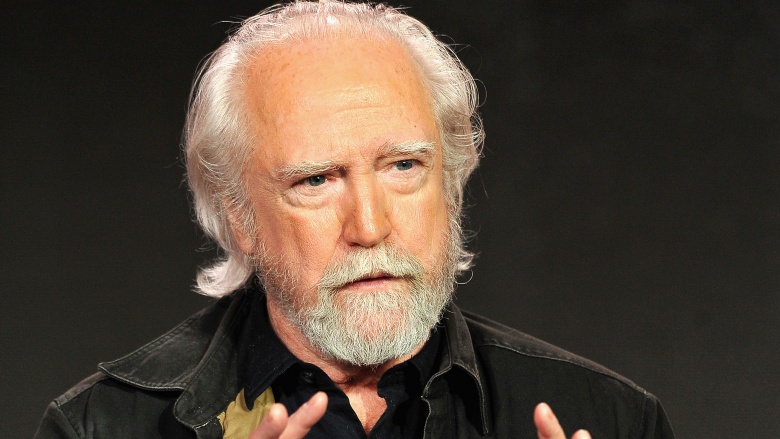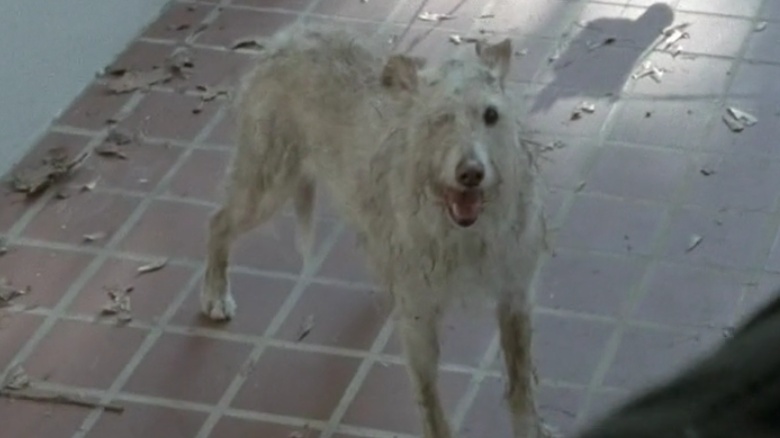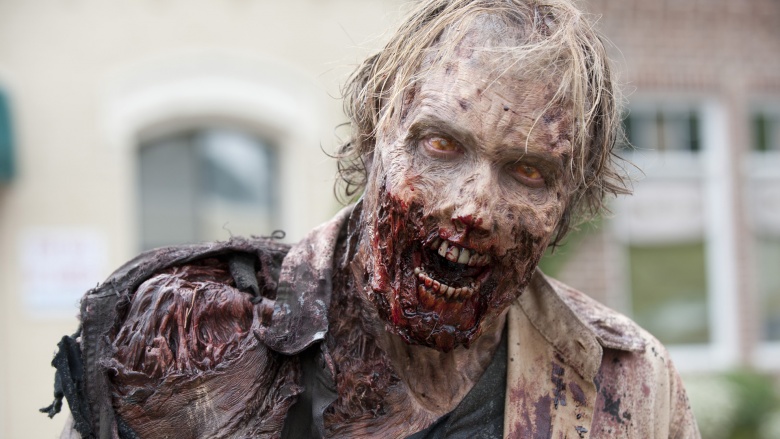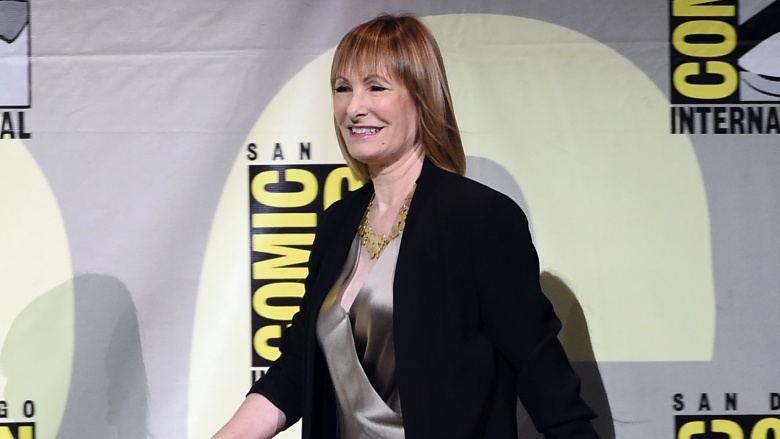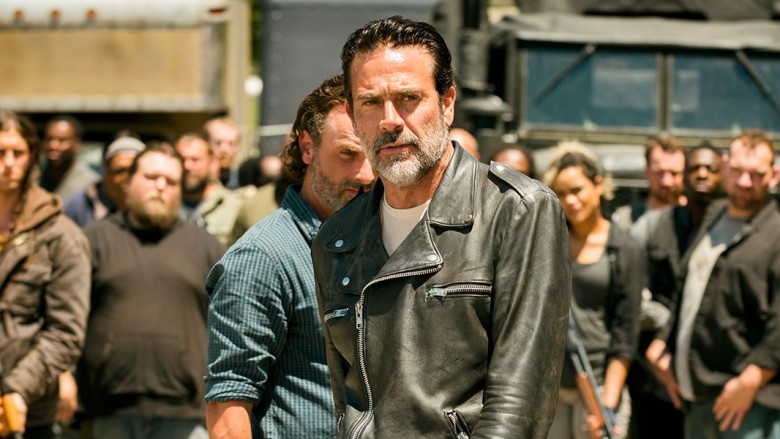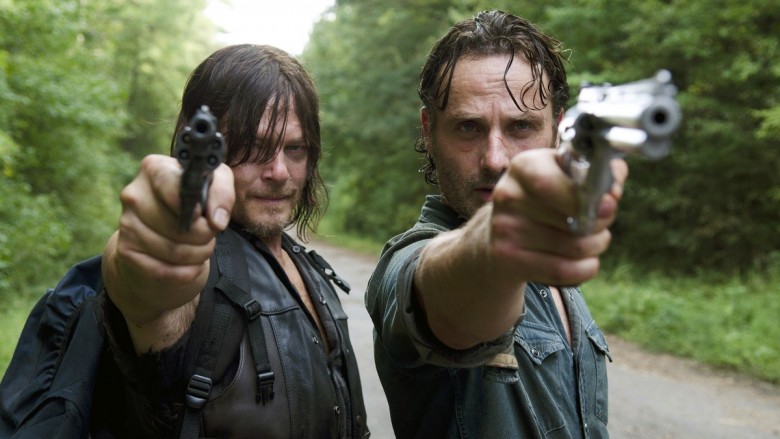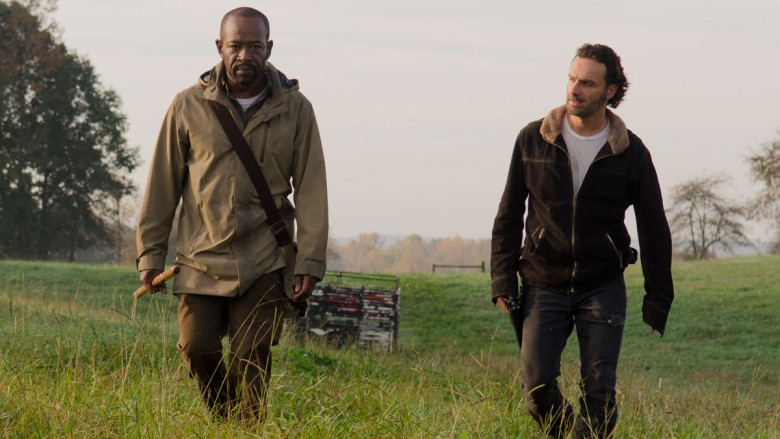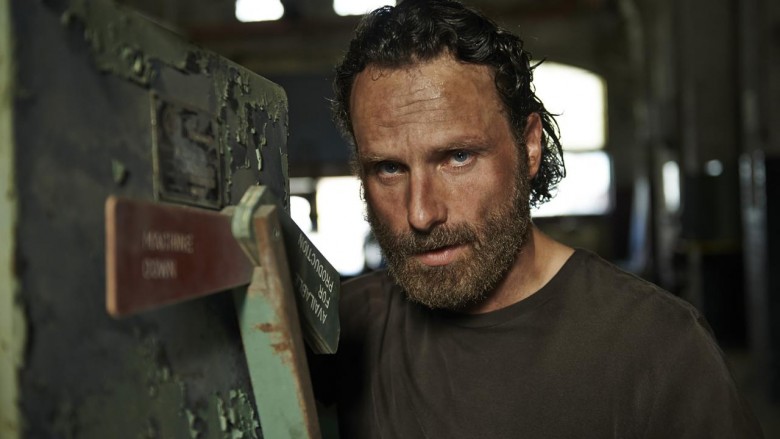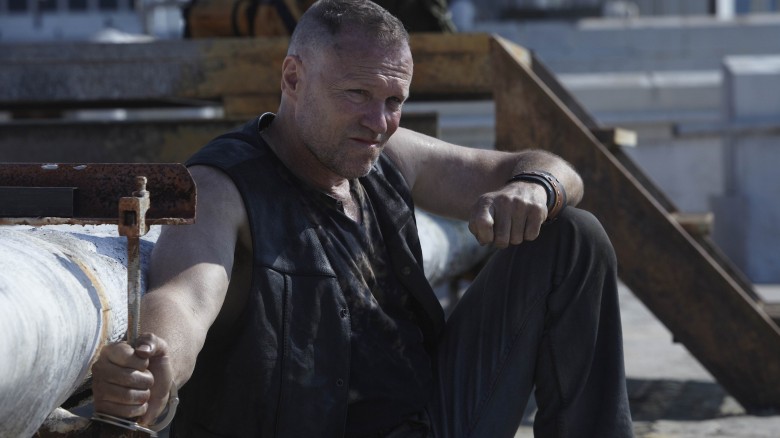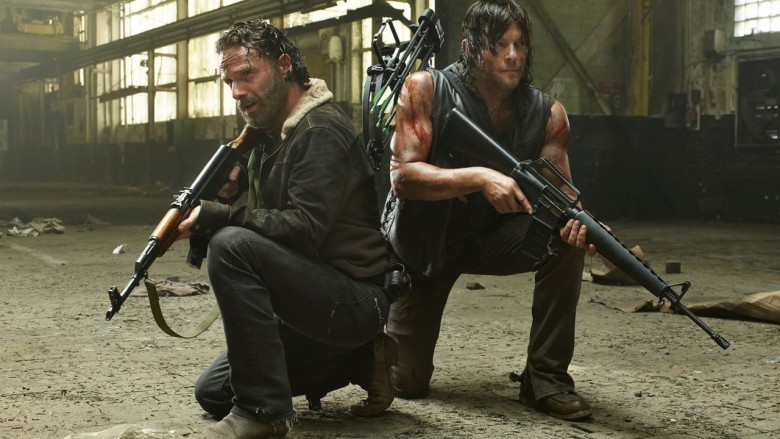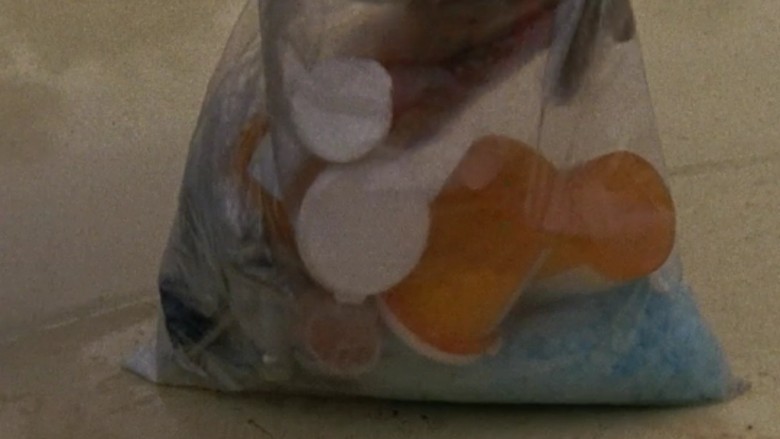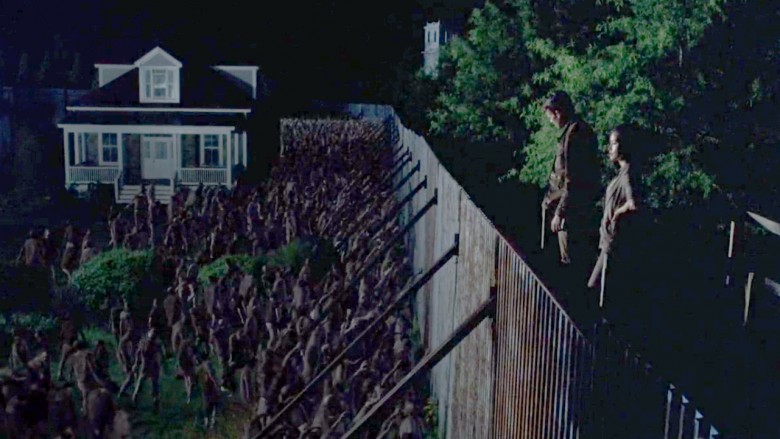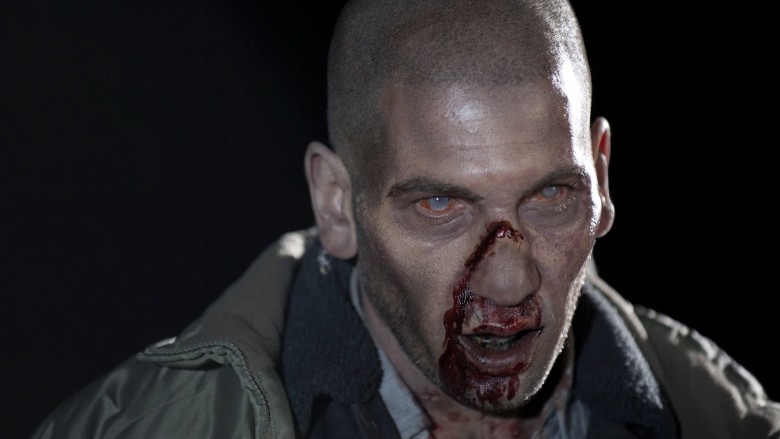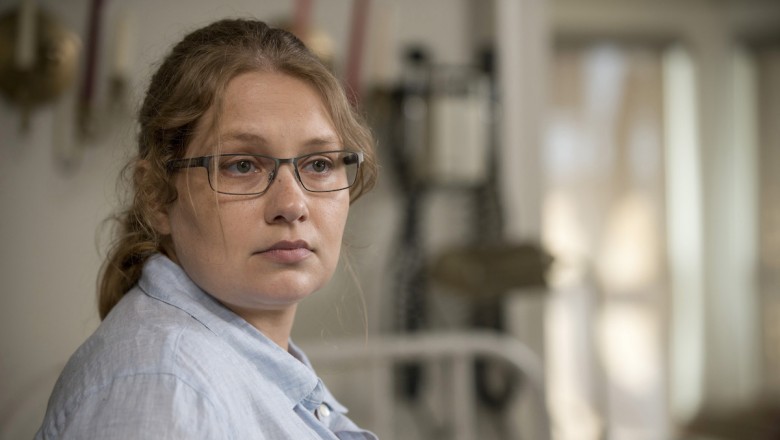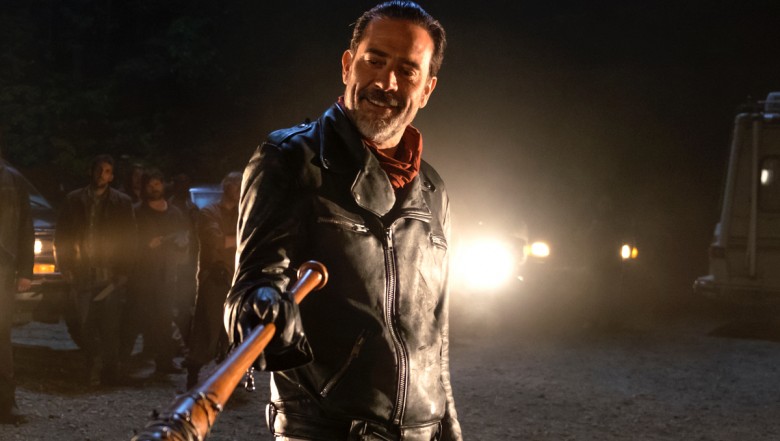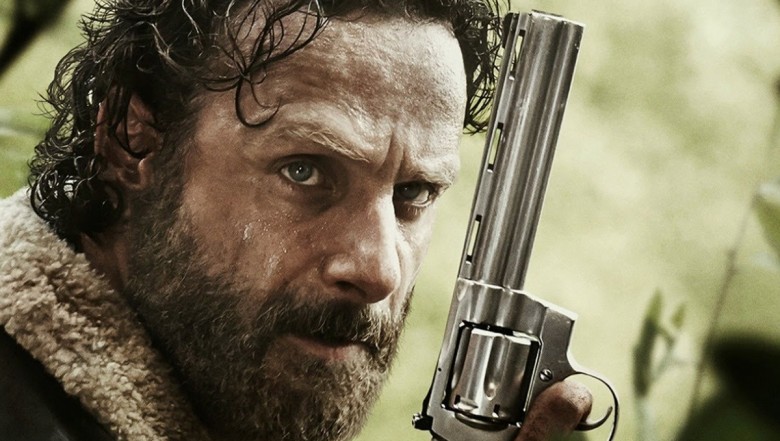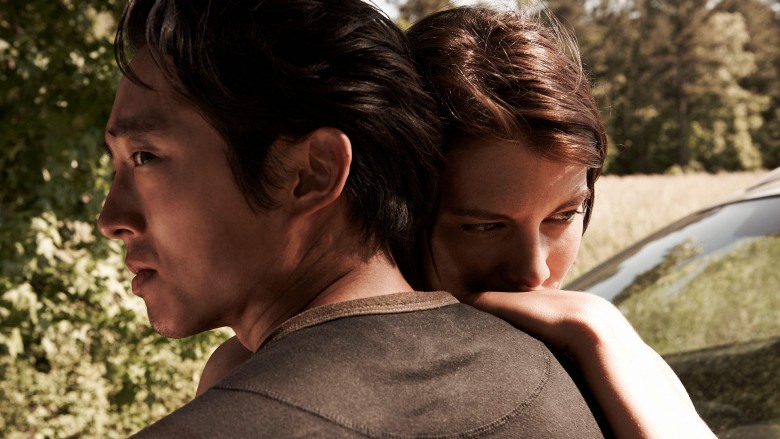The Untold Truth Of The Walking Dead
By all measures, The Walking Dead has been a whirlwind success for AMC, and its continued high ratings are proof that the recent zombie pop culture craze was more than some flash-in-the-pan fad. Lucrative as the show is, though, it's not been without its fair share of issues. Here's the history of The Walking Dead you might not know.
Beam me up, Robby
When comic book writer Robert Kirkman first came up with the concept of The Walking Dead, he didn't want his idea to fester in some pile of generic zombie pitches, so he added a little something extra to the mix: aliens. Kirkman revealed that when he first approached Image Comics about his story ideas, they thought it needed an extra hook, so he threw in an otherworldly element, suggesting that his zombies could have been sent to Earth by aliens. Kirkman never intended to follow through on that plot track, but it got him the green light. Ultimately, Kirkman did circle back on the alien theme in Issue #75, which featured a (non-canonical) bonus ending that served as a sort of homage to that original concept.
Artist bites back
Tony Moore, whose artwork appeared in the first six issues of Kirkman's comic series, filed suit against the author (his childhood friend) after he felt duped into signing over his financial rights to the franchise and was owed a significant slice of the brainy pie once the series hit it big. Kirkman disagreed and filed a counter-suit against Moore, alleging he'd breached their confidentiality agreement with his filing. The two amicably settled their dispute in 2012, but the biggest cost to both was their long-held friendship.
About that gloomy intro music
Bear McCreary is responsible for the spooky intro music that lulls us all into dreadful state of submission on The Walking Dead, and, yes, he intended to be that uniquely dreary from the start. In a 2010 interview with MTV News, he explained that he wanted to capture a sense of "emptiness" with the stringed notes of his opening number, as it was the feeling he got from watching the introductory art he was shown for the show: "I wanted to create something that would get stuck in your head, so that when you hear it, you would think of The Walking Dead." Mission accomplished.
Frank Darabont's unexpected goodbye
At first, AMC's The Walking Dead had Frank Darabont's fingerprints all over it, both stylistically and with his pick of original cast members (Melissa McBride, Laurie Holden, and Jeffrey DuMunn, in particular, had worked with him before). In an surprising network decision, though, Darabont was booted from the second season, despite its early ratings success.
AMC, which was fielding financial issues with the creators on Mad Men and Breaking Bad at the time, decided to slash its production budget on The Walking Dead and oust Darabont over creative and managerial differences. Glen Mazzara, who was Darabont's second in command for the show before being promoted to chief, said the split came from a mix of friction between Darabont and Kirkman, the network's inflexibility over prep time for the second season's premiere, and Darabont's strength as a filmmaker and not a showrunner that led to the split. Darabont is understandably not one of the millions of current viewers, and DeMunn followed him out.
After being let go, Darabont pursued legal action against AMC, testifying in a deposition that the network created "crisis-level problems" by slashing the show's budget in spite of ratings success and accusing executives of essentially inventing reasons to fire him. In late September of 2016, Darabont's lawyers revealed they were seeking more than $280 million in damages, a figure reflecting their case's contention that AMC deprived Darabont of revenue by artificially lowering the show's license fee. According to the judge presiding over the case, it's unlikely to see trial before 2018—leaving plenty of time for further accusations between Darabont and his former bosses.
Pre-Daryl Dixon
Norman Reedus' crossbow-wielding hero Daryl Dixon has emerged as one of the show's fan favorites, but Reedus originally auditioned for the part of Merle Dixon (which was already assigned to Michael Rooker). Showrunners liked him so much they created the part of Daryl (a character who, like Merle, does not appear in the comics) specifically for him. Daryl has been purposefully left "asexual" in order to preserve his mysterious appeal, despite many fan 'ships of him with the various ladies on the show.
Criminal cast activities
Some of The Walking Dead's cast members have found themselves in hot water for their off-camera bad behavior near the show's Georgia set. First, in 2012, actor Scott Wilson was arrested for drunk driving and was said to have been "swaying and asked to do yoga poses instead of a field sobriety test" when he was pulled over by police. (His character Hershel, fans might recall, was a recovering alcoholic on the show.) Then in 2015, Seth Gilliam, who plays the Reverend Gabriel Stokes, was also arrested for DUI (as well as reckless driving and marijuana possession), after being stopped for speeding at 107MPH in a 55MPH zone.
The gay character kerfuffle
The Walking Dead introduced its first gay characters in its sixth season by way of "Jesus" (played by Tom Payne) and Merritt Wever's Dr. Denise Cloyd. Kirkman personally advocated the move, saying "there should be more awesome gay people in fiction because there are plenty of awesome gay people in real life." The show's forward thinking was called into question, however, when one-half of the series' first lesbian couple was brutally killed in a fashion that, in the comics, happened to the male character Abraham. For some viewers, this was evidence The Walking Dead was following the "Dead Lesbian Syndrome" trope.
The hilarious language barrier
Steven Yeun was born in Seoul, South Korea, so his parents have something of a language barrier when it comes to fully understanding what's happening on the show. Apparently, in a moment of confusion, they told him to make sure and thank co-star McBride for that time she saved him. Even after Yeun tried to explain that everything happening on the show is fictional, his father insisted he share his thanks with her, so he did.
Hero dog
Dooley, the real-life dog who played Daryl and Beth's unnamed, one-eyed canine companion in The Walking Dead's fourth season, was a real-life hero. He lost his right eye while defending his owner from a carjacker. Bravest castmember ever?
Zombie makeup levels
With so many zombified extras at play in any given episode, the makeup department has had to be choosy as to which members of its crowd get the full work-up, so Greg Nicotero and his team have devised three levels of zombie makeup. There's "hero" (meaning they'll be seen up close so they need the full body makeover); "midground" (background players who get some facial touching up); and "deep background" (people only seen far back enough to wear a mask without any effects makeup). No matter the designation, though, they all have to go to "zombie school" to learn how to move like the rest of the biters.
Still time to go green, even in the apocalypse
Walking Dead producer Gale Anne Hurd has led the charge toward reducing the show's carbon footprint. Motivated by her personal interest in being environmentally friendly, Hurd spearheaded efforts to make the show a paper-free set (they use the Doddle app for call sheets on cast and crew devices), use more fuel-efficient vehicles, purchase reusable bottles in lieu of plastic water bottles, and move toward more sustainable materials.
It was turned down by two networks before finding a home
While The Walking Dead might seem like a no-brainer for the same network that brought us all Breaking Bad, AMC wasn't the first place the show was pitched by producers. Greg Nicotero told The Huffington Post that Gale Hurd originally approached other networks, including NBC and HBO, about adapting Robert Kirkman's series, but they asked her to compromise on the gore factor, something that became such a staple of the series' TV run with AMC.
"Thank goodness we wound up at AMC," Nicotero said. "They totally get this show. Right from the beginning, they've been completely trusting and supportive of what we've been trying to do with this series." Of course, that creative free reign would prove to be just as big a boon to the network in ratings, and HBO would soon follow suit in the grimness, gore, and guts department with Game of Thrones.
The second showrunner also quickly got the boot
After Darabont's untimely departure from the series, his deputy, Glen Mazzara was promoted for the second season. But his tenure on top wouldn't last long. After production on the second season was complete, writer Scott Gimple was called upon to take the lead, with Mazzara getting an unceremonious goodbye from the network. Rumors swirled that it was Kirkman who orchestrated his ouster, but Kirkman denied that, telling Rolling Stone, "It's unfortunate when someone of his stature starts saying stuff because it seems like they're in the know, but they're really not. It's definitely awkward because it wasn't like I had someone fired."
For his part, Mazzara cited creative differences as the reason for the second switcheroo, saying, "I can't say 'I wanted to do this, they wanted to do that.' It's just an accumulation of differences in tone, approach, storytelling. There wasn't any common ground. It was better to split amicably."
The first person to be cast on the show was not who you think
Considering he's been the central face of the series for the whole show, Walking Dead fans might suspect that Andrew Lincoln was the first person to be chosen for the role of Rick Grimes in the show. But that was, surprisingly, not the case. Lincoln told The Hollywood Reporter that he was actually cast after Lennie James, who played the character Morgan in the pilot and then disappeared for several seasons until returning in the middle of Season 3.
Andrew Lincoln almost took another role instead
In a major case of Hollywood sliding doors, Andrew Lincoln almost wasn't cast as Sheriff Rick because he had accepted a role in another film at the time. But life got in the way of him doing that movie because, as he told, The Hollywood Reporter, his second child was born shortly before the film was expected to commence production and he'd decided against going away to shoot it. "I got a friend to replace me in this movie and the next day, this script came through from AMC. I must have been on their radar with Frank [Darabont], and he wanted me to test. It was incredible," he explained.
What got him into the audition to begin with, he later revealed, was the fact that Darabont was involved, and he believed that meant the show could have a real future worth moving his growing family for. As he told Rolling Stone, "Frank talked us into getting on that plane."
One scene had the SWAT team swarming
During production on the second episode of the inaugural season, The Walking Dead's cast and crew got an unexpected set of visitors: the police's SWAT team. Michael Rooker was on a rooftop shooting Merle's rifle to simulate a zombie sniper session, but onlookers mistook his behavior for the real deal and called in the cops.
As Rooker later explained in a behind-the-scenes feature for the season, "I'm shooting zombies, you know, and I didn't really have any concern for that until I took the first shot and I saw people jump and run. They had already dispatched the SWAT team. The officer said, 'Please, stand down.'" It wasn't the last time a false alarm would ring regarding the show. In 2016, a Great Falls, Montana, family found themselves swarmed by police after neighbors called in a possible domestic violence incident involving guns inside their home ... because they were watching the show loud enough for neighbors to hear.
The cast loves to prank each other
For a show with such grisly material as The Walking Dead, its stars sure know how to have fun when the cameras aren't rolling. Actor Norman Reedus in particular has a long-running history of pranking Andrew Lincoln and others during production, and some of his greatest hits from the thick history book of their hijinx include Reedus filling Lincoln's car vents with glitter so that it exploded all over him as soon as he cranked the A/C and teaching him to greet Japanese fans with the phrase "where's the toilet" when he wanted to say "thank you for allowing me to be here." Lincoln's been known to get him back on occasion, too, like when he put Reedus' treasured motorcycle on a boat with a sex doll and sent it sailing to the middle of a lake.
There have been some key network Easter eggs
The Walking Dead is an Easter egg lover's dream because the show is filled with hidden tributes to its comic originator, other zombie epics, and more. Of the interesting winks to other series, AMC's sister hit Breaking Bad received some of the most clever winks. One such was the appearance of blue methamphetamine in a bag of drugs shown in the second season. In another, a drug dealer with a penchant for using the "b-word" was mentioned in dialogue as a seemingly direct reference to Aaron Paul's character Jesse Pinkman. The connections have been significant enough to even inspire some theorists to connect the timelines of the two shows and posit a cause-and-effect relationship between Walter White's chemical concoction and the onset of the zombie plague. Hey, anything's possible because The Walking Dead has still yet to explain where and why the walker infection happened.
Not all the neighbors are happy about the production site
You might think living in a small town where one of TV's biggest hits is made would be a treat, but for some residents of Senoia, Georgia, the experience of becoming a mini-Hollywood has been unpleasant at times. As reported by ABC News, some of Senoia's natives have been annoyed by being asked to change their activities in their hometown as a result of its proximity to the set–from taking pictures to trimming trees, show officials have stepped in to moderate what would otherwise be considered pretty ordinary behaviors.
Set attention has also spawned an army of "Walker Stalkers"–that is, fans who case the town in hopes of catching a glimpse–which is both a business boon and a headache for locals, especially when explosive scenes are being shot nearby one of the neighborhoods. To compensate for the troubles, though, some families are paid a monthly stipend of $400, and others have received in-person thanks from some of the cast.
Spoilers have been hard to hide
Although certain character deaths were foretold by the comics, The Walking Dead has deviated enough from its source material to still hold plenty of surprises in store for audiences. But there have been myriad other facts that have spawned major spoilers. For example, as Kirkman told Rolling Stone, shots of Jon Bernthal as Shane in walker makeup spread like wildfire across the internet after Walker Stalkers managed to snag a few photos of production in progress. The leak caused producers to officially enter the panic zone–fortunately, he said, "ratings went up" as a result of the gory glimpse.
Other deaths have been accurately predicted early by those fans who've kept a close eye on the production schedules of cast members and even casting news surrounding the stars. For example, when Steven Yeun snagged a film role in the months between the sixth and seventh seasons, it tipped off a lot of fans that he might be the mystery man at the receiving end of Negan's deadly swing. Meanwhile, actress Sonequa Martin-Green also landed a leading role in a new series, and, like clockwork, died off in the show in the episodes soon after the news. In other words, keeping an eye on the film trade for news about any given Walking Dead cast member has proven to be a pretty reliable way to find out who's coming up on the show's kill list, even if nothing leaks from the set itself.
One character death caused outrage--but not for the reason you think
While plenty of devastating character deaths have happened on The Walking Dead over the years, one killing in particular had commentators in a tizzy. In the sixth season, Merritt Wever's Dr. Denise Cloyd was killed off, and it wasn't just the fact that she died in a way that was meant, in the comics, to happen to the handlebar-mustachioed Abraham. Nor was she some fan favorite who had audiences gasping for air after her demise. Instead, it was the fact that her death added to a growing trend of that season in which lesbian characters were routinely and unceremoniously executed on various shows.
The show was immediately panned after the episode aired for playing into the "bury your gays" trope that seemed to be so common in mainstream television in 2016–The 100, Orange Is the New Black, The Vampire Diaries, and Pretty Little Liars were also among the year's offenders. Of the controversy, Wever herself told The Daily Beast, "I hadn't thought about it that way. ... I'm not sure that that's what was going on here but I understand the sentiment very well"
One season was particularly miserable for the cast (and audiences)
As evidenced by their social media feeds, The Walking Dead's cast has generally seemed to have a good time filming the series, despite the heat, long hours, and apocalyptic material involved in the show. But the first half of Season 7, the elevated violence level of which drove many watchers away for good, was universally miserable for the cast involved in production.
For Norman Reedus, it was the separation factor that made the episodes "rough" to shoot–and the same was true for Lennie James, whose character was kept apart from the rest for a large portion of the season. For others, though, it was the brutal content of the season that left them emotionally spent. Jeffrey Dean Morgan told Interview Magazine that he ran out of gas for hurting his friends on-screen. "They're all good people, and I love them—the whole cast—so to keep riding them as hard as I was riding them, in-between takes it was like, god, you've got to catch your breath a little bit," he said. "It was just so f**king heavy at all times. In the show that aired, there's no let up, and it was like that for 10 days for us. It wasn't just 40 minutes of it; it was 10 days of that, every day, all day."
The biggest shift from the comics has been purely due to convenience
One of the most glaring omissions from The Walking Dead's transformation from book to screen has been the fact that Rick's still wielding two hands. In the comics, The Governor cuts off Rick's right hand–his shooter side, no less–so when the character arrived on-screen in the third season, many readers were braced for the inevitable. But it never happened.
There have been a couple minor winks to the event, like the show-specific character Merle having to cut off his own hand to escape being handcuffed to a rooftop and Negan threatening to cut off Carl's hand in the seventh season. But Rick's still working with two fully functional fists. However, it's not for lack of interest or fidelity to the source material that this shift has taken place. In his Reddit AMA series, Kirkman explained the decision as a matter of mere practicality, writing, "To clarify, I think cutting Rick's hand [off] when we did was GREAT for the comic. It's just that in another medium it would be harder to pull off, we cheat in the comic because things aren't moving. You can't do that on the show. You'd see Rick not being able to reload his gun, and things like that. The CGI of cutting off Rick's hand would be expensive, but we did it with Hershel's leg so if we felt strongly about Rick losing a hand, we'd do it."
The end game is expected to be optimistic
The show may have diverged from Kirkman's ongoing comic series in some significant ways, but the writer still has a lot of creative influence and say-so on The Walking Dead, and according to him, fans can expect the ending to both versions to be hopeful. He told Marc Maron during a visit to WTF Podcast (via Variety), "It's a very popular show, and [the executives at AMC] seem to want it to go for 50 seasons. And it may go for 50 seasons, but there is definitely an end point at some point." He went on to add that while the present may be difficult for his cast of characters, the dogging fight for survival should end on a high note, saying, "I see the story from beginning to end, over many, many years, so I think it's a very hopeful story about humanity overcoming this insurmountable, apocalyptic situation. ... It's just gonna take them a long time to do it."

